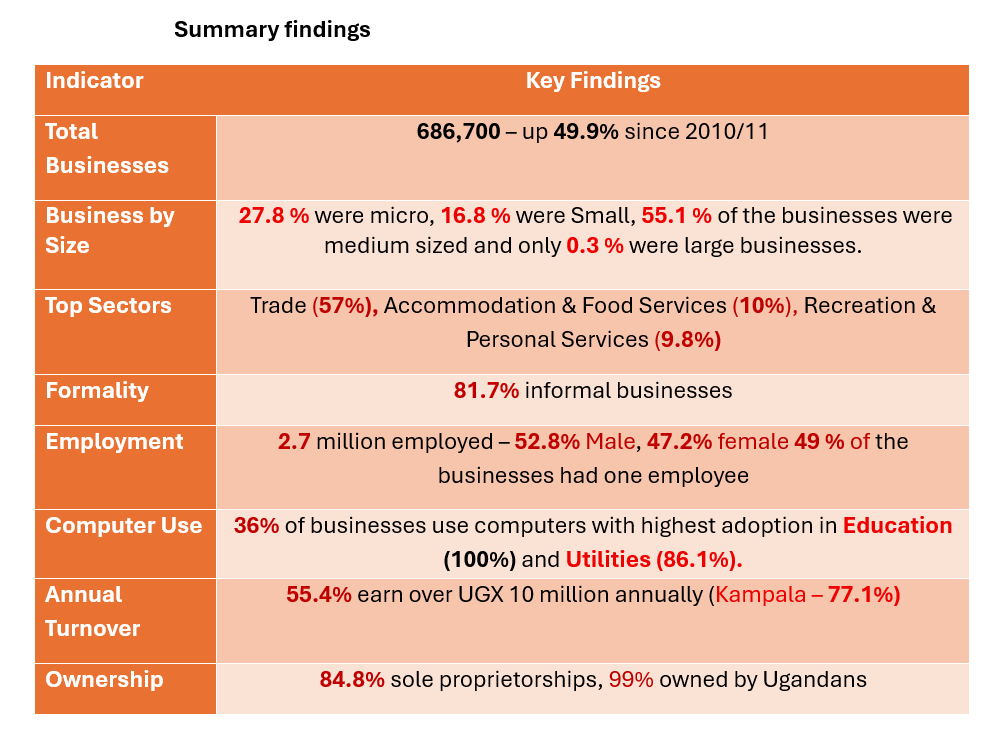The Uganda Bureau of Statistics (UBOS) has released the findings of the 2019/20 Census of Business Establishments (COBE), revealing significant growth in the country’s business landscape, alongside fresh insights into employment, technology adoption, and turnover trends.
The report shows that Uganda had 686,700 registered businesses in 2019/20, up from 458,106 in 2010/11, representing a 49.9% increase over the decade. This was UBOS’s third comprehensive business census, following earlier exercises in 2001/02 and 2010/11.
According to the report, the trade sector dominates, accounting for 57% of businesses, followed by Accommodation & Food Services (10%) and Recreation & Personal Services (9.8%). A majority of these businesses remain informal (81.7%), with Karamoja sub-region recording the highest share of informality (90.8%), compared to Kampala at 71%.
Employment Patterns
COBE 2019/20 revealed that nearly half of all businesses (49%) employ only one person, while 33% employ between 2–4 workers. Just 3% of businesses employ more than 20 people.
In total, 2.7 million Ugandans were employed in business establishments, with 52.8% male and 47.2% female.
Gender disparities were evident across sectors: Fishing (75%) and Food Processing (70%) were male-dominated. Accommodation & Food Services (53.2%) and Education (51.2%) had more female employees.
Technology Use
The census highlighted low adoption of digital tools, with only 36% of businesses using computers. Uptake was highest in the Education (100%) and Utilities (86.1%) sectors.
Turnover Trends
Over half of Uganda’s businesses (55.4%) reported an annual turnover above UGX 10 million. In Kampala, this share rose to 77.1%, underscoring the capital’s dominance in revenue generation.
Business Size and Ownership
55.1% of businesses were classified as medium-sized, 27.8% micro, 16.8% small, and only 0.3% large.
Ownership was overwhelmingly Ugandan (99%), with sole proprietorships making up 84.8% of all establishments. Male ownership dominated in Food Processing (72.1%), Transport & Storage (71%), and Fishing (71%).
Longevity
Most businesses were not newly established. Only less than 1% had operated for fewer than two years, while 42.5% had been active for 6–10 years.

Significance of COBE 2019/20
This was the first digital business census conducted by UBOS. It covered all fixed-location businesses and government agencies’ economic activities, excluding sectors such as public administration and defense.
UBOS Executive Director and Chief Statistician, Dr. Chris Mukiza, said the data provides a critical basis for evidence-based policy planning, investment decisions, and academic research:
“The Census of Business Establishments offers a clear picture of Uganda’s business structure, guiding both government and private sector strategies. It also helps build the sampling frame for future business surveys.”
The census was fully funded by the Government of Uganda and conducted with support from business owners, local government officials, and various stakeholders.
The full COBE 2019/20 report, including detailed sectoral and regional breakdowns, is now available from UBOS.









